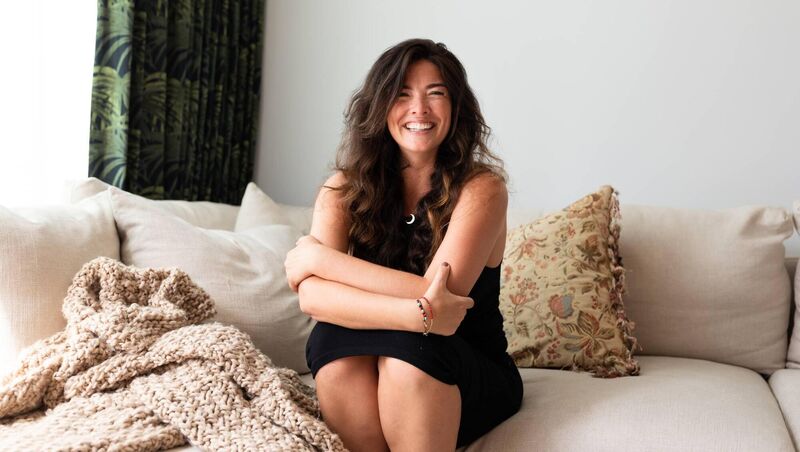THERE’S a scene in the 1992 movie Fried Green Tomatoes in which housewife Evelyn Couch and her fellow women’s circle participants are instructed to “slip off your panties and straddle your mirrors”.
Back in the ’90s, getting up close and personal with your vagina fell firmly into the category of New Agey woo-woo, but today, for sex educator Jenny Keane, it’s an integral part of her online orgasm workshop. Encouraging women to use a mirror to look at their vulva fosters both anatomical awareness and an understanding of how genitals function, because Keane asks, “If you don’t know where all the parts are and how all the parts function, how do you expect to be able to access pleasure?”
It’s so staggeringly obvious, it’s almost tragic, not least because it’s probably true to say that many women — let alone men — would be hard pressed to differentiate between a vulva and a vagina. Keane, a self-described “public-facing educator”, is on a mission to “give people the tools that they need” to support their sexual wellness. And there’s no shortage of takers.
Keane’s original in-person orgasm workshop facilitated 100 women in 2019. The pandemic necessitated a move online in May 2020, and in the space of a year, Keane “had 20,000 women come through orgasm online”. Social media content restrictions preclude her from advertising, so “it was all word of mouth”, spreading like wildfire through WhatsApp groups, she says.
Keane traces her journey to becoming a sex educator back to her menstruation. Her periods were so debilitatingly painful that she would be “buckled over the desk” at school. In time, the Clontarf teenager was diagnosed with endometriosis and polycystic ovary syndrome (PCOS) and prescribed the contraceptive pill to manage her symptoms. “[With] my menstrual cycle, I thought I had to be a passive participant,” she says, an assumption that was turned on its head when she went to the US post-university.
A stint as a yoga teacher in California led to an immersion in women’s circles, where the encouragement of “holistic, hippie women” ultimately transformed her approach to her menstrual cycle and her body from passive to active. A G-spot weekend workshop in San Francisco left her “completely changed” and sparked her “appetite for sex education”.
She trained in somatic therapy, somatic sex therapy, and trauma therapy, aiming to “satiate my own curiosity and to have my own questions answered” but as she began to share what she’d learned with friends, family and her yoga students, her path to becoming a sex educator began to evolve organically.
The realisation that her clients lacked “the very basics of sex education” precipitated her first workshop, orgasm, which facilitated women who were experiencing difficulty reaching orgasm, or were unable to orgasm. Many had menstrual issues, and Keane notes research that shows “98% of women who suffer with PCOS experience sexual dysfunction of some kind. One hundred per cent of women with endometriosis experience sexual dysfunction. I think that’s mind-blowing”.
Tuning into your body
Keane’s efforts at managing her own challenging menstrual symptoms are equally mind-blowing. After two years of actively addressing her symptoms (she’d come off the pill while in the US) through functional medicine, nutrition and exercise, the crippling pains ceased and her cycle, which had veered anywhere from 39 to 75 days, stabilised at a “completely regular” 29 days.
Keane is quick to stress that while her choices were right for her, “it is not the route for everyone”. The relationship she developed with her cycle still serves her today — she had a baby with her partner last year — and she is “very attuned to my body and the way that it speaks to me”.
This “tuning in” is at the core of her teaching; the how-to of getting back in touch with the body’s messages so that they can be responded to and managed. Her work was initially female-focused but that shifted as women requested she also educate their men. Now, she’s completely inclusive.
“Regardless of who you are, what gender you are, what your relationship status is, it’s information for absolutely everybody about how to access more pleasure in your day-to-day life.”
Mostly, it’s women of 25-plus who attend her workshops, but she’s had attendees in their 50s, 60s, and 70s, and “people bringing their mothers”.
The “story of sex” has changed through the generations, she says, segueing from one of duty and procreation (baby boomers) to exploration (Gen X) and now to a focus on one’s own pleasure (millennials and Gen Z).
So, what about the influence of porn on those younger generations?
“When we talk about porn, it’s really important to say that mainstream porn isn’t meant to be sex education. The purpose of mainstream porn is to bring people to arousal quickly,” she says. “If you are turning to mainstream porn for sex education, it’s like looking at The Fast & the Furious to learn how to drive.”
 Jenny Keane. Picture: Orfhlaith Whelan
Jenny Keane. Picture: Orfhlaith Whelan
Her focus is on helping the “huge numbers of adults who were once children who never received a sex education that they should have” and are now “trying to rewrite those stories and those scripts … so they can figure out what parts of that story works for them and what parts of that story does not work.
“I think when you know your full story, you learn how to rewrite it in a way that works for your life.”
Keane regularly appears at festivals — WellFest, All Together Now, and Electric Picnic this year — runs her own live events (for people who “want to be in a place where this conversation is celebrated, where it’s normalised, where they can go with their partner, with their friends, and can really have a laugh”) and has a website, to which an “online toy shop” has recently been added as “a response to the huge amount of messages I received looking for suggestions about what toys to use”. It’s all under the umbrella of her brand, Oh! Moment, which takes “an education-first approach to wellness”.
Her goal is to “try to make the conversation about sex as mainstream as possible. I believe that this conversation is just like any other conversation”.
For those who feel “a little bit trepidatious” and prefer to explore her content in the safety of their own environment, she has online sex-education workshops, which fall into two categories: for people “experiencing sexual issues who might want to have more information about how to support themselves on a day-to-day basis”; and sex skills workshops, which explore putting “play and creativity back at the centre of sex again, because that’s ultimately where it belongs”.
It’s a far cry from repressed Catholic Ireland of yore, but while Keane says that “shame is something we all carry”, she stresses it’s not something we are born with and can be unlearned. Shame can be attached to different parts of our sexual story, she says, citing examples such as being told sex before marriage is shameful, or masturbation is a sin, or feeling shame around our body or its appearance.
“We have to look at the parts of our story that shame clings to so that we understand how it operates, and then we can slowly start to remove it.”
Education is empowering
Tantra yoga is a core element of her offering, but contrary to popular belief, the practice “does not involve sex in any way, shape, or form”. Rather, it’s a way of connecting to the body with the pelvis as the focus; again, it’s all about tuning in.
That tuning in can happen at any stage of life, she says, and finds commonplace sexual issues such as vaginal dryness in menopause, or difficulty reaching orgasm, can often spark questioning, positive action and a segue from being a passive participant to an active one. For Keane, education leads to empowerment, and “being connected to your body helps you figure out what it’s saying to you so that you can support it in really important ways”.
To illustrate, she cites a recent Kinsey Institute study on menopause, which found that 36.2% of the menopausal women surveyed reported experiencing improved symptoms through masturbation. Only 44% reported discussing menopause with their healthcare provider, and of that cohort, just 5% said their provider suggested masturbation as a symptom-relief strategy.
For Keane, sexuality is inextricably linked to who we are and how we express ourselves.
“When we feel good about our bodies, when we feel connected to our bodies, when we feel that we can, when we don’t feel numbness, when we feel sensation, then that ripples into every part of our life, into how we show up, how we walk down the street, how we walk into a room, right?
“What we’re willing to say yes to, what we’re willing to say no to, the confidence that we have and exude in all aspects of our life, whether that’s at work or in our relationship — that’s really the power of sex education, in that it really does have this incredible ripple effect into all aspects of your life.”
- Jenny Keane’s Orgasm Tour is at the Everyman Theatre on October 21. See everymancork.com
